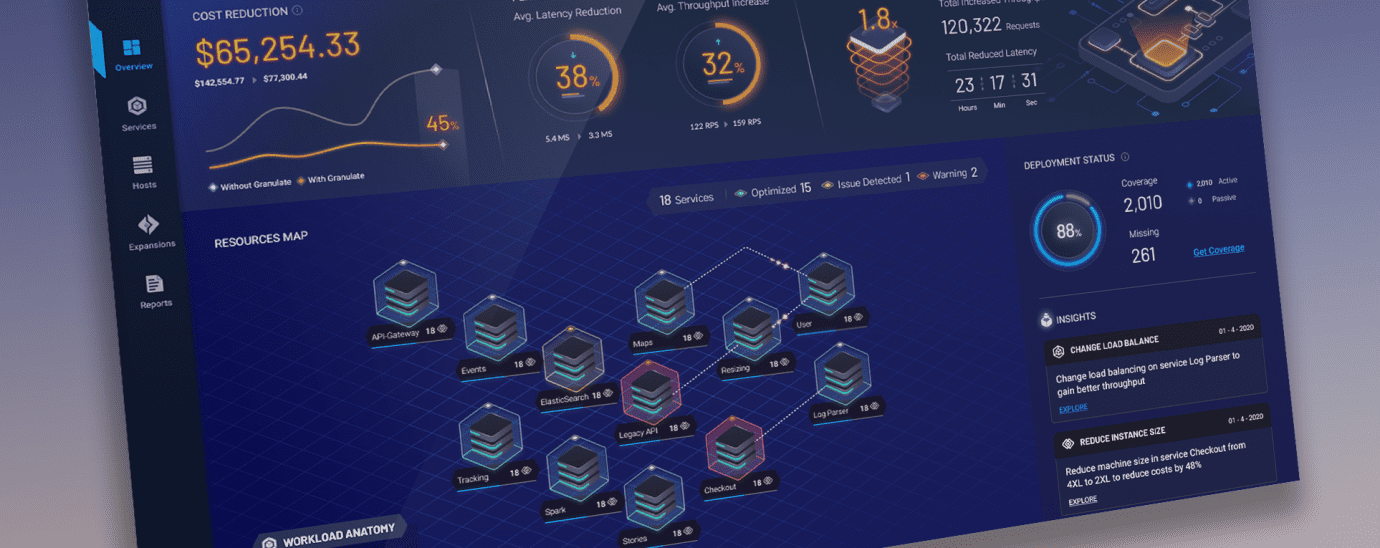Granulate launches real-time optimization platform for servers, resulting in increased computing power and up to 60% reduced costs

New technology cuts response time by 40 percent based on results from Intel, Google Cloud, Amazon Web Service, IBM Cloud, and Microsoft Azure.
Recently, Granulate announced for the first time the general availability of their real-time continuous optimization solution for server workload performance and gCenter panel. Through dynamic AI-driven, continuous OS and kernel level adaptations tailoring the infrastructure to specific application needs, Granulate’s agents allow organizations to achieve lower computing costs by a proven 60%, obtain better performance with a proven 40% response time reduction, and handle more load on each machine with 5X more throughput. With no code changes required, Granulate’s solution delivers cost savings and improved response time within a few days of installation, all without any R&D efforts.
“We founded this company to tackle IT infrastructure under-utilization and to create sustainable performance and scale for everyone,” said Asaf Ezra, co-founder and CEO at Granulate. “In a world of increasing architecture complexity and constantly changing production environments, our goal is to relieve businesses of their performance challenges, slashing computing costs while simultaneously improving quality of service.”
Granulate’s new gCenter panel provides its clients with real-time visibility into the performance gains and cost reduction of the product. Using gCenter our clients can control their agents and deploy Granulate on additional services seamlessly. The product enables all clients to view their data in real time, and activate agents and specific features of their choosing quickly and easily.

Granulate is a solution for organizations both large and small to achieve performance gains in their server capacities while reducing costs in real-time.The platform maintains its effectiveness at scale and supports enterprise-level customers. Recent customer success stories include: PicsArt, Perion, AppsFlyer and Coralogix, all achieving over 30% cost reduction while gaining improved application performance within several days with zero code changes to their application.
“Each of Granulate’s agents is self-contained and performs automated optimizations,” said Tal Saiag, co-founder and CTO at Granulate. “We’re running with over 40,000 instances. We see it scales seamlessly and are excited to open the solution to everyone.”
Granulate’s agent automatically learns an application’s specific resource usage patterns and data flow. By analyzing CPU scheduling order, oversubscribed locks, memory, network, and disk access patterns, Granulate’s agent automatically identifies contended resources, bottlenecks, and prioritization opportunities. The AI-powered agent then tailors OS-level scheduling and prioritization decisions regarding CPU, locks, caches, and network accesses to drastically improve the application performance. The improved performance then allows organizations to reduce their cluster size and downsize their machines.
The Granulate agents are infrastructure agnostic and can be easily installed with a single command line on any Linux server at any scale regardless of architecture, be it data-centers, cloud, or orchestrated environments.
Granulate also formed strategic partnerships with leading cloud providers and major vendors in the field, partnering with AWS, Azure, GCP, VMWare and Redhat to expand their market reach with the goal of helping more customers achieve better operational efficiency.
To learn more about what Granulate can do for your organization, please visit www.granulate.io.